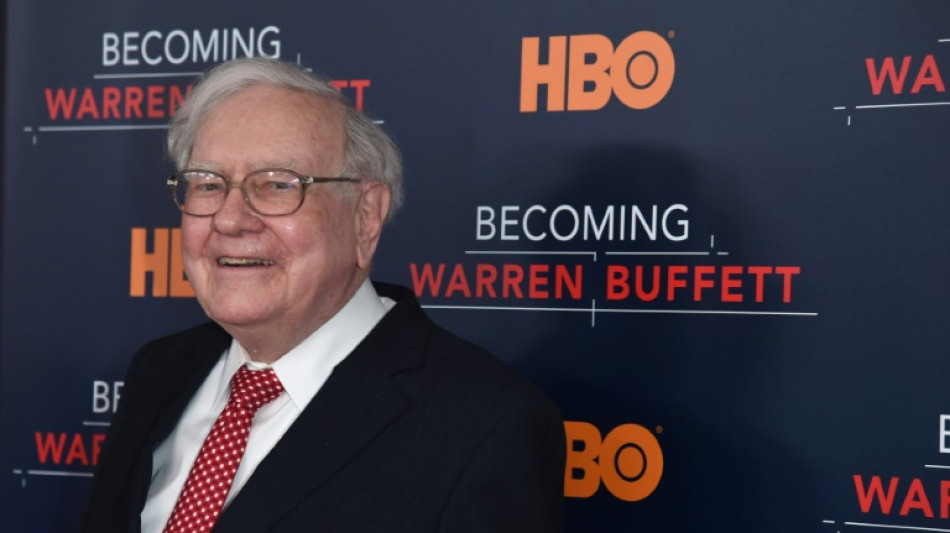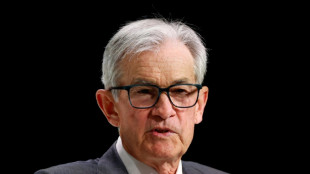
Warren Buffett to retire from Berkshire Hathaway by year's end

Influential billionaire investor Warren Buffett said Saturday he would retire from leading his Berkshire Hathaway business group by the end of the year and that he would recommend his chosen successor Greg Abel take over.
Buffett's success, coupled with his ability to explain his thinking in clear soundbites, has made him highly influential in the business and financial communities, earning him the nickname "The Oracle of Omaha."
Buffett indicated several years ago 62-year-old Abel would be his pick for successor.
"The time has arrived where Greg should become the chief executive officer of the company at year end," Buffett, 94, told an annual shareholder meeting in Omaha, the Midwestern city where Berkshire is based.
Buffett said he believed the board of directors would be "unanimously in favor of" his recommendation.
"I would still hang around and could conceivably be useful in a few cases, but the final word would be what Greg said in operations, in capital deployment, whatever it might be," he added.
Buffett transformed Berkshire Hathaway from a medium-sized textile company when he bought it in the 1960s into a giant conglomerate, now valued at more than $1 trillion and with liquid assets of $300 billion.
- 'Wizard of Wall Street' -
Peter Cardillo of Spartan Capital Securities described Buffett as the "Wizard of Wall Street" and said his announcement could come as a relief to those worried about succession.
"This helps alleviate concerns about who will replace him and may very well be well received by his followers," Cardillo told AFP.
The company on Saturday reported first-quarter profits of $9.6 billion, down 14 percent. That works out to $4.47 per share, also down sharply.
And Buffett's net worth as of Saturday was $168.2 billion, according to Forbes magazine's real-time rich list.
"I have no intention -- zero -- of selling one share of Berkshire Hathaway. I will give it away eventually," Buffett told shareholders, who responded with a standing ovation.
"The decision to keep every share is an economic decision because I think the prospects of Berkshire will be better under Greg's management than mine."
"So that's the news hook for the day," Buffett quipped.
Abel, a long-time core figure of Berkshire, joined the group in the energy division in 1992 and has been on the board of directors since 2018.
"Greg Abel and the rest of the team has huge shoes to fill, and they have immense amounts of cash to put to work if they so desire," said Steve Sosnick of Interactive Brokers.
"This is truly the end of an era," he added.
- Trade 'should not be a weapon' -
Buffett earlier used the stage to declare that "trade should not be a weapon," in remarks clearly targeting US President Donald Trump's aggressive use of tariffs against countries around the world.
"There is no question that trade can be an act of war," he said, without mentioning Trump by name.
Those comments came as analysts in the United States and abroad have expressed growing concern that tariffs could seriously slow global growth.
Two months ago, Buffett told a CBS interviewer that tariffs "are a tax on goods" -- and not a relatively painless revenue-raiser, as Trump has suggested -- adding, "I mean, the Tooth Fairy doesn't pay 'em!"
On Saturday Buffett urged Washington to continue trading with the rest of the world, saying, "We should do what we do best and they should do what they do best."
Achieving prosperity is not a zero-sum game, with one country's successes meaning another's losses, he said. Both can prosper.
"I do think that the more prosperous the rest of the world becomes, it won't be at our expense. The more prosperous we'll become, and the safer we'll feel," Buffett said.
He added that it can be dangerous for one country to offend the rest of the world while claiming superiority.
"It's a big mistake, in my view, when you have seven and a half billion people that don't like you very well, and you got 300 million that are crowing in some way about how well they've done," Buffett told shareholders.
Compared to that dynamic, he said, the financial markets' recent gyrations are "really nothing."
A.Lewandowski--GL

 London
London

 Manchester
Manchester
 Glasgow
Glasgow
 Dublin
Dublin
 Belfast
Belfast
 Washington
Washington
 Denver
Denver
 Atlanta
Atlanta
 Dallas
Dallas
 Houston Texas
Houston Texas
 New Orleans
New Orleans
 El Paso
El Paso
 Phoenix
Phoenix
 Los Angeles
Los Angeles



